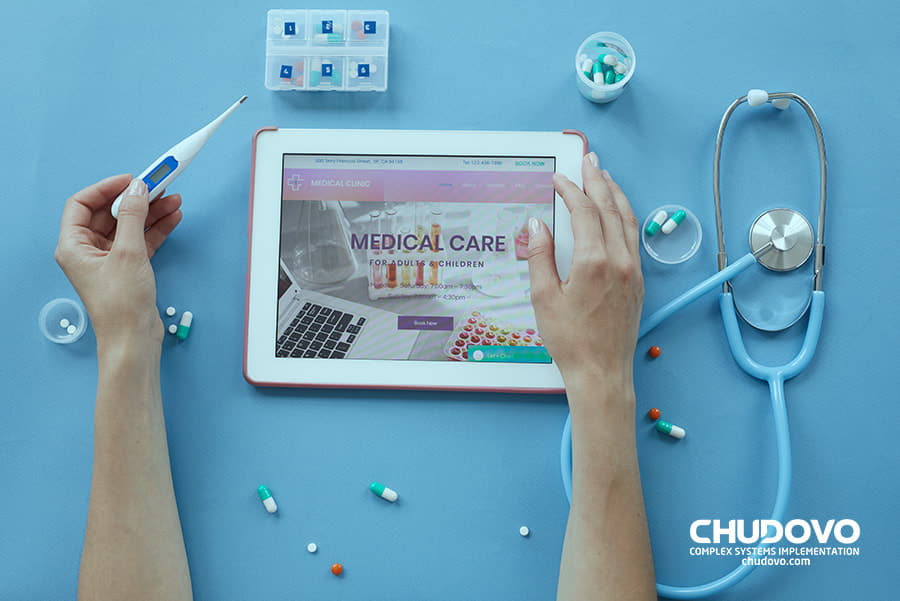Building Your Own Healthcare App in 2023: A Step-by-Step Guide
The healthcare industry has been rapidly evolving over the years, and mobile applications have been at the forefront of this transformation. As technology continues to advance, we can expect to see an increasing number of healthcare apps being developed.
Businesses that need a healthcare app or those in the healthcare industry looking for ways to improve patient care can benefit greatly from building their own customized app. However, with so many factors involved in developing a successful application, it is important to approach it systematically by following a step-by-step guide.
In 2023, custom Healthcare App Development will be easier than ever before. This article aims to provide businesses with an informative and comprehensive guide on how they can develop their own Healthcare App using cutting-edge techniques that will help them stay ahead of the competition.
Table of contents
- What Is Healthcare App Development?
- Types of Healthcare Apps
- The Benefits of a Healthcare Mobile Application
- What Is the Difference Between a Health App and a Medical App?
- Process of Healthcare Application Development
- How to Develop a Healthcare App
- Pros & Cons of Healthcare App Development
- How Much Does It Cost to Develop a Healthcare App?
- Choosing a Healthcare App Development Company: Tips and Things to Pay Attention To
- In conclusion
- FAQs

What Is Healthcare App Development?
Healthcare app development is the process of creating mobile applications that are designed to improve access to healthcare services and information. These apps can be developed for a wide range of purposes, including tracking medication usage, scheduling appointments with doctors or therapists, monitoring health metrics like blood pressure and heart rate, accessing digital health records, or connecting patients with medical professionals in real-time.
The development process for healthcare apps typically involves several stages. The first stage is planning; this involves identifying the purpose of the app and defining its functionality. Developers must also determine what platforms (iOS vs Android) their target audience primarily uses and requirements they may need to adhere to, such as HIPAA compliance if handling sensitive patient data.
Next comes the design phase, which looks at areas such as aesthetics and ease-of-use from a patient’s perspective and any healthcare staff who will be using it on their end. Our developers go through multiple iterations before finalizing one (Wireframing/Prototyping).
Once stakeholders have approved designs, then move on to the programming phase, where developers build out all necessary functionalities according to specifications provided earlier in the planning stage. Healthcare application Development requires careful consideration towards security measures, especially when working with very critical user data ensuring there is no room for error.
Overall, the Healthcare App Development project lifecycle takes around 3-6 months, depending on the complexity of specific projects. In the end, you’ll see an improvement in productivity and a real impact within your desired targeted audience, improving healthcare accessibility overall.
Types of Healthcare Apps
Healthcare apps have become an important tool for the modern healthcare industry. They offer a convenient way for patients to manage their health, track their progress, and communicate with medical professionals.
There are several different types of healthcare apps available on the market today. Some focus on specific conditions or illnesses, while others aim to provide more general health information and resources.
- One popular type of healthcare app is the symptom checker app. These applications allow users to enter symptoms they are experiencing and receive potential diagnoses based on that information. While these apps should not be used in place of professional medical advice, they can be useful tools for initial screening or determining whether a visit to the doctor is necessary.
- Another common type of healthcare app is the fitness tracking app. These applications help users monitor their physical activity levels, set goals for themselves, and track progress over time. Some even include social features that allow users to connect with friends who can encourage them in their fitness journey.
- Chronic illness management apps are also becoming increasingly popular among patients who need ongoing care for conditions such as diabetes or asthma. These applications often include tools like medication trackers and reminders as well as educational resources about managing one’s condition effectively.
- Finally, telemedicine has emerged in recent years as another major area where mobile healthcare technology is making significant strides forward. With virtual consultations now being offered by many doctors’ offices around the world due largely to necessity during pandemic lockdowns – telemedicine enables remote access via videoconference calls between doctors & remote patients, meaning no longer do people have physically go see physicians unless there is something which needs to be tested first-hand.
Whether you’re looking into building your own custom-built Healthcare App coming up this year 2023 or simply seeking new ways to enhance patient care through already existing platforms; there are plenty of options out there catered towards all sorts of different functionalities ensuring maximum efficiency and productivity!
The Benefits of a Healthcare Mobile Application
Healthcare mobile apps offer numerous benefits, ranging from improving patient outcomes to reducing healthcare costs.
Patients can use these apps for quick access to medical advice, online consultations with doctors, and tracking medications & appointments. Furthermore, they can monitor their health metrics like blood pressure or glucose level from their phones.
On the other hand, medical professionals can leverage these apps for managing patient data in real-time, providing remote assistance during emergencies or accessing critical clinical information at their fingertips.
One major advantage of healthcare app development is its ability to streamline workflows between various stakeholders within the industry – hospitals/clinics, patients/customers & insurance providers. This helps improve operational efficiency while minimizing errors that may arise from disconnected systems.
Moreover, building your own Healthcare App provides an opportunity for businesses that want better branding & customer loyalty through an engaging user experience (UX). A well-developed app will help strengthen relationships between businesses and customers by offering timely updates regarding upcoming appointments/events; sending regular reminders about medication regimens while allowing them full control over personal health data privacy/security measures implemented therein.
In short, it can be stated that investing resources into creating custom Healthcare Apps is a worthwhile investment as it offers many advantages. Improved operational efficiency in workflow to increase patient/customer satisfaction makes these healthcare solutions more convenient. Moreover, enhanced brand recognition and heightened security features protecting sensitive information against cyber threats are the major benefits of healthcare mobile app development.

What Is the Difference Between a Health App and a Medical App?
As businesses look to develop their own healthcare apps, it’s important to understand the difference between a health app and a medical app. While both types of apps focus on improving one’s health and wellness, they serve different purposes.
Health apps are designed for general wellness tracking and lifestyle management. They can track daily steps, calorie intake, water consumption, or sleep patterns. These types of apps are not government-regulated as they do not claim to diagnose or treat any medical conditions.
On the other hand, medical apps provide clinical support for healthcare professionals in diagnosing and treating patients with specific conditions. These applications must comply with strict regulatory guidelines set by the government in order to ensure their safety.
When developing your own healthcare app, it’s important to determine which category your application falls under to navigate development and distribution regulations properly.
By understanding these differences between health apps and medical apps, businesses can create effective tools that help improve patient outcomes while remaining compliant with government regulations.
Process of Healthcare Application Development
Developing a healthcare application requires careful planning and execution. The process involves multiple stages, each with its unique set of challenges and requirements.
- First Step
The first step in building a healthcare app is to identify the problem that the app will solve. Healthcare businesses need to analyze their operations and determine which areas can benefit from automation or improved communication between patients and providers.
- Second Step
Once you have identified your target audience, it’s time to create a prototype of the application. This stage involves designing an interface that is user-friendly, intuitive, and easy to navigate for both patients and providers.
- Third Step
After creating a prototype, it’s time to gather feedback from potential users through focus groups or user testing sessions. This valuable input can help refine the design of the app before development begins.
- Fourth Step
With all these initial steps completed successfully, the software development team must begin coding functionalities into their software architecture using appropriate tools such as programming languages like Java or Swift.
- Fifth Step
Testing should be done thoroughly on different devices such as mobile phones/tablets & desktops/laptops so they work adequately without crashing under any circumstance. Next, every possible scenario must be accounted for beforehand, whether intentionally caused by end-users (e.g., network disruption) or unintentionally caused by themselves during daily usage (e.g., typo errors).
- Last Step
Finally comes the launching step- where developers need extensive marketing campaigns built around social media promotion channels, press releases across relevant niche publications, and email campaigns.
Finally, developing healthcare applications demands intricate knowledge across multiple disciplines, such as IT infrastructure management skills coupled with a deep understanding of Pharmaceutical regulations governed by regulatory bodies worldwide along with technology integration methodologies.
How to Develop a Healthcare App
To develop a successful healthcare app, there are several steps that must be taken.
- The first step is to identify the purpose of the app and its target audience. This will help determine what features should be included in the final product.
- Next, it’s important to choose an experienced and reliable software development team who specializes in healthcare mobile application development, like Chudovo. They should have experience with HIPAA compliance for protecting sensitive patient information as well as user interface design expertise.
- Once you have selected your team of developers, they need all necessary requirements from you, like API Integration or any third-party integration required based on your plan.
- Then comes the designing phase, where UI/UX designers create wireframes & mockups. The process includes designing different versions of screen layouts until satisfactory result gets achieved from both the client side & end-users perspectives.
- The next phase is Core Development, followed by testing phases such as QA Testing / UAT Testing, ensuring bug-free apps are ready before launching, including Launching apps on Store platforms like App Store (iOS) or Play Store (Android).
Testing all aspects of your application functions properly is crucial because incomplete thorough testing may lead to unexpected errors later. Apps update launch after feedback has been received from users making use, i.e. giving review ratings, making complaint/suggestion mailing etc.
In order for your healthcare app to stand out among competitors, you must ensure constant updating according to the latest trend with a user-friendly environment. You must focus on keeping up with changes in industry trends, having full transparency when managing consumer data, and providing exceptional customer service.
Overall, creating a healthcare app can be a daunting task, but with the right guidance and tools, it is possible to develop an effective application that meets the needs of both patients and healthcare professionals.
Pros & Cons of Healthcare App Development
Healthcare app development has become an increasingly important investment for healthcare businesses in 2023. With the rise of mobile technology, individuals are becoming more invested in their own health and wellness, seeking personalized solutions to improve their overall well-being. Here, let’s learn some pros & cons of healthcare app development.
Pros of Healthcare App Development
- Increased accessibility to healthcare services
Healthcare apps provide users with on-demand access to medical advice and resources, allowing them to better manage chronic conditions or address acute health concerns from the comfort of their own homes.
- Improved patient engagement and adherence
By providing patients with real-time data on their health status and actionable insights into how they can improve it, apps can help individuals stay motivated and focused on achieving their health goals.
- Opportunity to gather valuable data
Healthcare app development offers a unique opportunity for businesses to gather valuable user data that can be used for research purposes or improving existing services.
- Helps in research
Data collected through these apps – including biometric measurements such as heart rate variability – give researchers access to large amounts of previously unavailable information about individual habits and behaviors related to personal well-being.
Overall, investing in healthcare application development provides many significant benefits that both businesses and users stand to gain immensely when executed properly. Let’s have a look at the cons of these applications.
Cons of Healthcare App Development
- Costly
To begin with, developing healthcare applications often comes with a hefty cost. As such, small business owners and individual developers may find it difficult to invest in these projects. Similarly, the complexity of healthcare applications may cause delays in development, resulting in huge expenses.
- Need a careful approach
App developers need to be extremely careful when designing healthcare applications. As these apps are used to manage sensitive medical information, they need to be built with the highest security standards. Errors or loopholes in security could put patient data at risk, which could lead to serious legal ramifications.
- Privacy and data compliance
Another key consideration is user privacy and data compliance. Companies must adhere to various regulations and standards when collecting medical data and managing user information. Failing to comply with these could lead to serious fines or even lawsuits.
- Slow user reach
Introducing new healthcare applications may take some time for users to get used to them. Many users may find it difficult to switch to a new digital solution and may be hesitant to provide their medical information.
It is thus important to create user-friendly apps that enhance user experience and make the transition easier.

How Much Does It Cost to Develop a Healthcare App?
When it comes to developing a healthcare app, the cost can vary greatly depending on several factors. It is important for businesses looking to develop their own healthcare app to understand these factors in order to make informed decisions and budget accordingly.
- One of the biggest factors that affect the cost of developing a healthcare app is functionality. More complex apps with advanced features, such as integration with wearables or AI-powered diagnosis tools, are likely to be more expensive compared to simpler apps that provide basic health tracking and appointment scheduling.
- Another factor that affects cost is the development process itself. In-house development teams may be able to save costs compared to outsourcing. However, there are limitations when it comes to the expertise required for the implementation of tech stacks like blockchain databases or HIPPA-compliant data security practices.
- Lastly, the platform used also plays an important role in determining the costs associated with creating an application. Developing mobile apps specifically targeting Android OS versus iOS could render different pricing demands due to various factors such as available APIs, programming languages, etc.
In short, the total cost involved in developing your own mHealth App will vary considerably based on specific requirements. From functionally involved, development methodology, and hardware/software- these all affect cost. Chudovo has a skilled team with extensive experience building similar software products, particularly in healthcare, which can help minimize risks while ensuring high-quality outcomes.

Certified engineers
Convenient rates
Fast start
Profitable conditions
Agreement with
EU company
English and German
speaking engineers
Choosing a Healthcare App Development Company: Tips and Things to Pay Attention To
Choosing a reliable Healthcare App Development Company is crucial, as it can make or break the success of your app. When selecting a healthcare app development company, there are several things that businesses should pay attention to.
- Firstly, choosing an experienced development team with expertise in creating custom mobile apps for the healthcare sector is important. The company should have sufficient experience handling complex projects involving electronic health records (EHR) and data security compliance protocols like HIPAA & GDPR.
- It’s also essential to look into their previous work by understanding their capabilities, such as user interface design proficiency or data analytics ability. A potential partner must be able to offer high-quality services, including information architecture consulting on how best you could structure and present your content within an application; how easily users find relevant functions throughout the navigation system.
- The chosen team must follow Agile methodology, which implies an iterative approach towards the medical app development lifecycle, starting from defining requirements to testing & deployment phases.
- They must ensure optimal collaboration between product owner/client-partner-team members providing frequent checkpoints and allowing proactive feedback-based changes/updates on the project plan accordingly across all stakeholders involved, avoiding rework leading to time/cost savings.
- Lastly, check if they possess strong domain knowledge about key concepts such as telemedicine solutions/applications; remote patient monitoring applications using wearables/sensors, which would help greatly while designing unique solutions catering to what businesses require.
Overall, when choosing a Healthcare App Development Company, it’s essential for companies to prioritize good communication skills combined with technical competency. This will ensure both parties are aligned throughout the app creation journey delivering desired results at the end of the entire process and giving satisfied user experience/platforms.
In conclusion
To sum up, building your own healthcare app in 2023 can be a highly beneficial investment for businesses in the healthcare industry. With the ever-increasing popularity of smartphones and mobile devices, having a well-designed and user-friendly healthcare app can give businesses an edge over their competitors.
Developing a successful healthcare app requires careful planning, effective communication with customers and stakeholders, thorough market research, and constant testing to ensure that it meets the needs of its users. Additionally, utilizing artificial intelligence technology within your healthcare app can help improve its efficiency by automating certain tasks, such as patient data collection or appointment scheduling.
Overall, creating a great healthcare application is not only about providing convenience to patients but also improving overall patient outcomes through better access to information and care. By following this step-by-step guide on developing your own custom-made healthcare application, you will be able to create an efficient product that positively impacts both patients’ lives as well as your bottom line.
FAQs
What are the benefits of building a healthcare app?
Building a healthcare app can bring numerous benefits to both businesses and consumers. Healthcare apps offer improved accessibility, convenience, and personalization for patients seeking medical care. For businesses in the healthcare industry, developing an app can increase patient engagement, improve communication between doctors and patients, reduce administrative costs, and enhance brand loyalty.
Is it difficult to develop a healthcare app?
Developing a high-quality healthcare app requires specialized knowledge in both technology and medicine. However, with the right team of developers experienced in mobile health application development combined with medical professionals’ expertise—any business or individual looking to build an effective health-care offering will be able to do so successfully.
How long does it take to develop a healthcare app from start-to-finish?
The timeline for developing your own customized healthcare offering varies depending on several factors such as project scope complexity or other factors like budget constraints etc. Some basic apps might only require a few weeks, while others may take upwards of months; development timeframes are highly dependent on specific circumstances.
How much does it cost to build my own customized Health App
The cost involved in building your customized Healthcare Mobile App from scratch will depend upon multiple variables such as project scope complexity requirements (features), developers’ team experience/expertise level-and, market price rates etc.
If you need highly qualified healthcare app developers at the right price for your project, contact us now!





